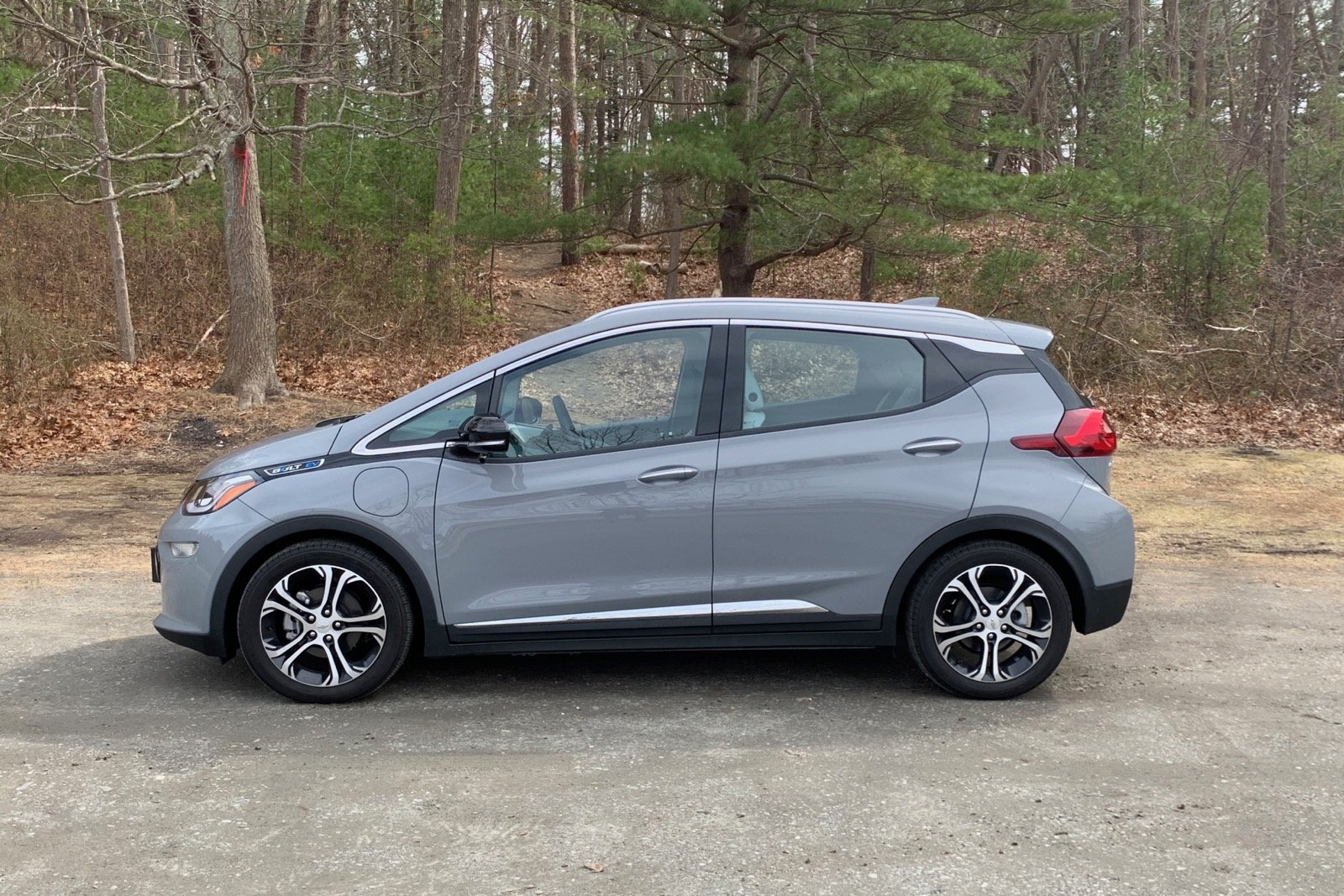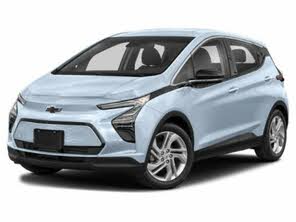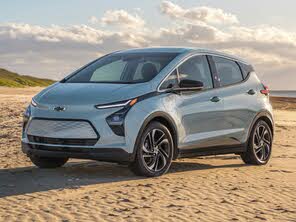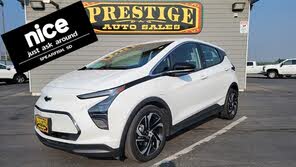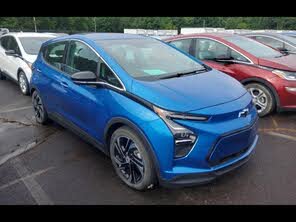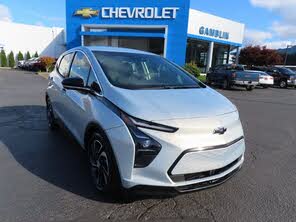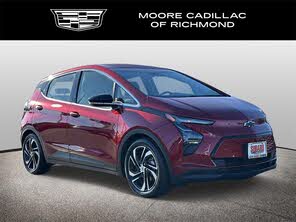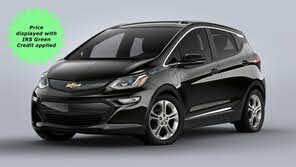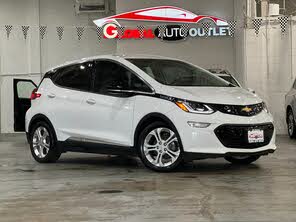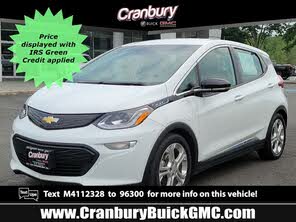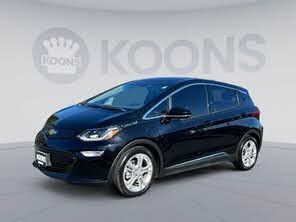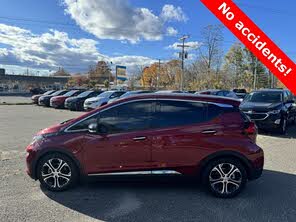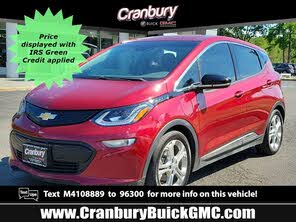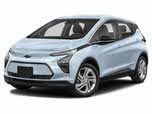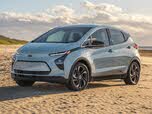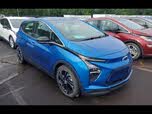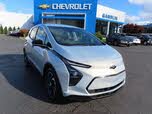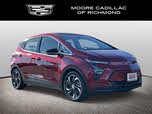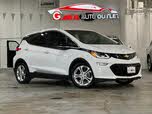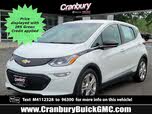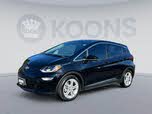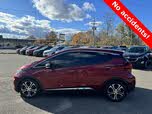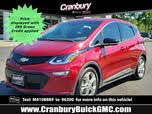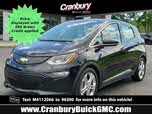2022 Chevrolet Bolt EV vs 2021 Chevrolet Bolt EV
CarGurus highlights
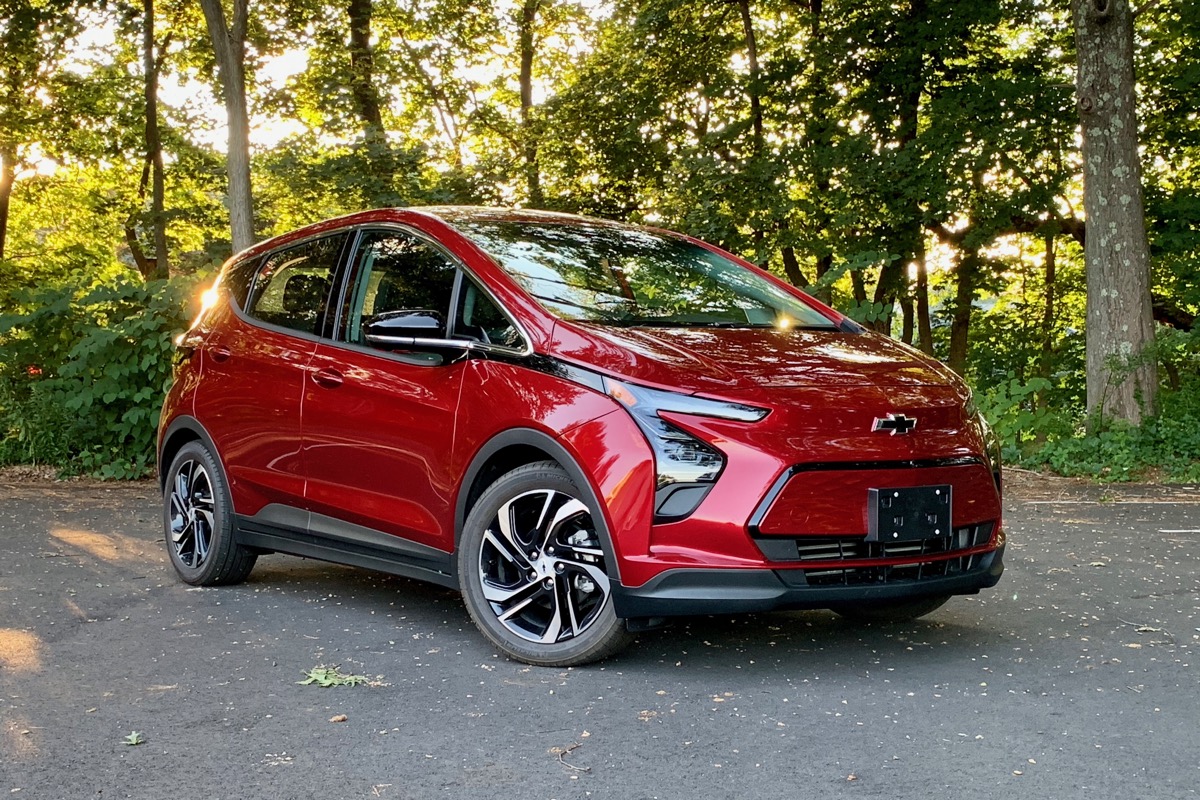
According to CarGurus experts, the overall rating for the 2021 Chevrolet Bolt EV was 7.2 out of 10, while the 2022 Chevrolet Bolt EV scored 8 out of 10. With a higher rating and improvements in design, technology, and standard safety features, the 2022 Chevrolet Bolt EV emerges as a stronger contender. Offering a more user-friendly infotainment system, a fresh and modern look, and better standard safety equipment, the 2022 Chevrolet Bolt EV is the recommended choice for consumers looking for a practical yet advanced electric vehicle.
Choose the 2022 Chevrolet Bolt EV if:
- You desire a more modern and aggressive exterior design that stands out.
- An upgraded infotainment system with wireless smartphone connectivity is essential.
- Standard advanced safety features like automatic emergency braking and lane-keep assist are important to you.
Choose the 2021 Chevrolet Bolt EV if:
- You prefer a more traditional hatchback design with a conventional yet functional cabin.
- Extensive cargo space with the option for a removable load floor is crucial for your needs.
- The higher range of 259 miles per charge is more appealing.
Overview | |
MSRP$36,500 | MSRP$31,500 |
Average price$17,905 | Average price$18,229 |
Listings237 | Listings130 |
Ratings & Reviews | |
User Reviews | User Reviews |
Expert reviews7.2 out of 10 | Expert reviews8.0 out of 10 |
Pros
| Pros
|
2021 Chevrolet Bolt EV Reviews SummarySpend any time reading the news, and you’ll likely read about electric vehicles. They are influencing the stock prices of major automakers, and in turn, those automakers are investing heavily into a burgeoning market of EV startups. And yet, electric cars make up an incredibly small portion of the new car market. For all the news and hype, there are only a handful of actual models on the road today. They fall into two categories: larger, luxury-minded EVs like those offered by Tesla, and smaller, minimalist offerings such as the Nissan Leaf and the 2021 Chevrolet Bolt EV. Like the Leaf, the Bolt does things differently from Tesla. It uses a smaller battery pack and maximizes the efficiency of its nimble platform. The Bolt EV does not have the range or acceleration of the Teslas, but for many Americans, an EV like the Bolt EV is something closer to what they can afford. But is the Bolt EV right for you? Read on to learn more about this economic electric vehicle. | |
2022 Chevrolet Bolt EV Reviews SummaryElectric vehicles are the future. Even racing and off-road enthusiast have accepted this reality with the knowledge that EVs can be fun and engaging. We’ll lose the smell and the sounds, but one of the key purposes of racing is to improve the breed, so why not welcome the transition to electric propulsion? The 2022 Chevrolet Bolt EV could not be further from an enthusiast vehicle, but it’s just as important—if not more so—to the auto industry. Introduced for the 2017 model year and updated for 2022, the Bolt EV is the tip of GM’s EV spear. More EVs are coming, but it all starts here. For 2020, the Bolt EV's range was increased to 259 miles. That carries over to 2022, and the Bolt EV gets standard DC fast charging as well, making it a more realistic option for more car shoppers. But is it enough to get you to make the leap to EV? | |
No video found | |
Popular Features & Specs | |
Engine200 hp Electric | Engine200 hp Electric |
Drive TrainFWD | Drive TrainFWD |
Seating Capacity5 | Seating Capacity5 |
EV Battery Capacity66 kWh | EV Battery Capacity66 kWh |
MPG City127 | MPG City127 |
MPG Highway108 | MPG Highway109 |
Battery Charge Time (120V)64 hours | Battery Charge Time (120V) |
Battery Charge Time (240V)10 hours | Battery Charge Time (240V)7 hours |
Engine | |
Engine Name200 hp Electric | Engine Name200 hp Electric |
Battery Charge Time (120V)64 hours | Battery Charge Time (120V) |
Battery Charge Time (240V)10 hours | Battery Charge Time (240V)7 hours |
DrivetrainFWD | DrivetrainFWD |
Fuel Economy | |
EV Battery Capacity66 kWh | EV Battery Capacity66 kWh |
MPG City127 | MPG City127 |
MPG Highway108 | MPG Highway109 |
Interior | |
Seating Capacity5 | Seating Capacity5 |
Safety | |
Front Crash Overall4 | Front Crash Overall5 |
Side Crash Overall5 | Side Crash Overall5 |
Dimensions & Capacity | |
Cargo Space16.9 cu ft | Cargo Space16.6 cu ft |
Curb Weight3563 lbs | Curb Weight3589 lbs |
Height62.8 in | Height63.4 in |
Length164.0 in | Length163.2 in |
Width80.3 in | Width80.3 in |
Wheelbase102.4 in | Wheelbase102.4 in |
Number of doors4 | Number of doors4 |
CarGurus highlights

According to CarGurus experts, the overall rating for the 2021 Chevrolet Bolt EV was 7.2 out of 10, while the 2022 Chevrolet Bolt EV scored 8 out of 10. With a higher rating and improvements in design, technology, and standard safety features, the 2022 Chevrolet Bolt EV emerges as a stronger contender. Offering a more user-friendly infotainment system, a fresh and modern look, and better standard safety equipment, the 2022 Chevrolet Bolt EV is the recommended choice for consumers looking for a practical yet advanced electric vehicle.
Choose the 2022 Chevrolet Bolt EV if:
Shop Now- You desire a more modern and aggressive exterior design that stands out.
- An upgraded infotainment system with wireless smartphone connectivity is essential.
- Standard advanced safety features like automatic emergency braking and lane-keep assist are important to you.
Choose the 2021 Chevrolet Bolt EV if:
Shop Now- You prefer a more traditional hatchback design with a conventional yet functional cabin.
- Extensive cargo space with the option for a removable load floor is crucial for your needs.
- The higher range of 259 miles per charge is more appealing.
Overview | ||
MSRP | $36,500 | $31,500 |
Average price | $17,905 | $18,229 |
Listings | ||
Ratings & Reviews | ||
User reviews | 4.3 | 4.0 |
Expert reviews | 7.2 out of 10Read full review | 8.0 out of 10Read full review |
Pros & cons | Pros
| Pros
|
Summary | Spend any time reading the news, and you’ll likely read about electric vehicles. They are influencing the stock prices of major automakers, and in turn, those automakers are investing heavily into a burgeoning market of EV startups. And yet, electric cars make up an incredibly small portion of the new car market. For all the news and hype, there are only a handful of actual models on the road today. They fall into two categories: larger, luxury-minded EVs like those offered by Tesla, and smaller, minimalist offerings such as the Nissan Leaf and the 2021 Chevrolet Bolt EV. Like the Leaf, the Bolt does things differently from Tesla. It uses a smaller battery pack and maximizes the efficiency of its nimble platform. The Bolt EV does not have the range or acceleration of the Teslas, but for many Americans, an EV like the Bolt EV is something closer to what they can afford. But is the Bolt EV right for you? Read on to learn more about this economic electric vehicle. | Electric vehicles are the future. Even racing and off-road enthusiast have accepted this reality with the knowledge that EVs can be fun and engaging. We’ll lose the smell and the sounds, but one of the key purposes of racing is to improve the breed, so why not welcome the transition to electric propulsion? The 2022 Chevrolet Bolt EV could not be further from an enthusiast vehicle, but it’s just as important—if not more so—to the auto industry. Introduced for the 2017 model year and updated for 2022, the Bolt EV is the tip of GM’s EV spear. More EVs are coming, but it all starts here. For 2020, the Bolt EV's range was increased to 259 miles. That carries over to 2022, and the Bolt EV gets standard DC fast charging as well, making it a more realistic option for more car shoppers. But is it enough to get you to make the leap to EV? |
Video | No video found | |
Popular Features & Specs | ||
Engine | 200 hp Electric | 200 hp Electric |
Drive Train | FWD | FWD |
Seating Capacity | 5 | 5 |
EV Battery Capacity | 66 kWh | 66 kWh |
MPG City | 127 | 127 |
MPG Highway | 108 | 109 |
Battery Charge Time (120V) | 64 hours | |
Battery Charge Time (240V) | 10 hours | 7 hours |
Engine | ||
Engine Name | 200 hp Electric | 200 hp Electric |
Battery Charge Time (120V) | 64 hours | |
Battery Charge Time (240V) | 10 hours | 7 hours |
Drivetrain | FWD | FWD |
Fuel Economy | ||
EV Battery Capacity | 66 kWh | 66 kWh |
MPG City | 127 | 127 |
MPG Highway | 108 | 109 |
Interior | ||
Seating Capacity | 5 | 5 |
Safety | ||
Front Crash Overall | 4 | 5 |
Side Crash Overall | 5 | 5 |
Dimensions & Capacity | ||
Cargo Space | 16.9 cu ft | 16.6 cu ft |
Curb Weight | 3563 lbs | 3589 lbs |
Height | 62.8 in | 63.4 in |
Length | 164.0 in | 163.2 in |
Width | 80.3 in | 80.3 in |
Wheelbase | 102.4 in | 102.4 in |
Number of doors | 4 | 4 |
The 2021 Chevrolet Bolt EV sported a shape that was meticulously optimized for aerodynamic efficiency. Its jellybean silhouette was akin to other efficiency-focused cars like the Nissan Leaf and Toyota Prius. However, a more upright design gave the Bolt EV a distinct profile that provided drivers with a commanding road view and outstanding sightlines. Signature Chevrolet design elements such as the polygon lower grille and the "floating" roofline along the D-pillar visually broke up the hatchback design. While the interior carried a futuristic aura with flowing plastic panels and bright colors, the conventional steering wheel and a confusing control layout somewhat marred General Motors' modernistic approach.
By contrast, the 2022 Chevrolet Bolt EV received a bold update, presenting a more futuristic and aggressive design that made it stand out among electric vehicles. It shared a family resemblance with vehicles like the BMW i3, lending it an electric persona through and through. Inside, it balanced futuristic elements with daily functionality. The cabin adopted design cues from other new Chevrolet products and had the upscale feel of a downsized Cadillac. Notably, the trims were rebranded, with the 2022 Bolt EV offering the 1LT and 2LT trims, positioning the Premier trim for the more upscale Bolt EUV.
The 2021 Chevrolet Bolt EV was powered by a 66-kilowatt-hour lithium-ion battery pack that supplied energy to a front-wheel-drive electric motor. This setup produced 200 horsepower and 266 pound-feet of torque. With the torque available at zero rpm, the Bolt EV had an impressive low-end pickup and could accelerate from 0 to 60 mph in 6.5 seconds. While this acceleration was modest compared to Tesla models, it was quite brisk for a compact car. The low placement of the battery contributed to a low center of gravity, enhancing the vehicle's cornering ability and making city driving more enjoyable. However, the Bolt EV exhibited some drawbacks at highway speeds, including twitchy steering and susceptibility to crosswinds, alongside notable wind noise.
The 2022 Chevrolet Bolt EV maintained the 200 horsepower and 266 pound-feet of torque but with a slight adjustment to a 65-kilowatt-hour battery pack. The low-end acceleration was quick and responsive, and it performed better than expected at highway speeds, such as overtaking and merging. The Sport mode further enhanced throttle response, though at the cost of range efficiency, particularly over 65 mph. Thanks to the low center of gravity, the 2022 Bolt EV felt agile and spry around corners. Sport mode added a bit of heft to the steering, making it feel more engaging for spirited driving. One quirk was the proprietary shifter design, mimicking Honda's, potentially leading to confusion regarding the car's gear status. The introduction of "full regen" or "one-pedal driving" added an extra layer of driving dynamics, allowing efficient deceleration without using the brakes.
The 2021 Bolt EV provided an impressive 56.6 cubic feet of cargo space with the rear seats folded down. With the rear seats up, the cargo space was 16.9 cubic feet. These numbers were instrumental in making the Bolt EV a practical choice for everyday use. The tall design allowed for a spacious cabin, with ample head and legroom in the front seats. Second-row passengers enjoyed good headroom but might find legroom lacking if the front seats were pushed back. The absence of power-adjustable seats contributed to the vehicle's efficiency and simplicity. Manual adjustments helped drivers find an optimal seating position, complemented by practical storage solutions like deep in-door pockets and a large center console tray.
The 2022 Bolt EV offered 16.6 cubic feet of cargo space behind the rear seats, slightly less than its predecessor. However, folding down the rear seats increased the cargo capacity to 57 cubic feet. This was more than the Volkswagen Golf and even the new Bolt EUV. The upright driving position combined with a spacious interior made the 2022 Bolt EV feel larger than its subcompact classification would suggest. Front and rear passengers enjoyed a comfortable ride, although rear legroom might be slightly cramped for taller passengers on longer trips. The interior update also moved the cupholders to a more convenient location, enhancing overall usability.
The 2021 Bolt EV's infotainment system was a deviation from GM's usual setup, featuring a 10.2-inch touchscreen that felt like a prototype. The layout was clunky, and the screen was laggy, though it did offer extensive energy displays to monitor charging and usage. The mix of touch controls and hard buttons created a confusing interface. However, standard features included Apple CarPlay and Android Auto, and the fully digital instrument panel allowed for customizable energy usage displays. The Chevrolet smartphone app was a useful addition for monitoring charging status and other factors that could impact range.
For 2022, Chevy upgraded the Bolt EV's infotainment system while retaining the same 10.2-inch touchscreen size. The new system featured wireless Apple CarPlay and Android Auto, integrating it with the more user-friendly Chevrolet Infotainment System 3. The energy consumption and charging pages were retained but were presented in a more conventional and intuitive format. This update made the Bolt EV more appealing to new EV drivers. Although the volume and tuning dials, along with the home button, were positioned awkwardly to the left of the screen, the inclusion of these physical controls ensured ease of use.
In 2021, the Bolt EV came with standard safety features such as airbags, traction control, and a backup camera. Chevy's Teen Driver feature allowed for setting speed and volume limits for secondary drivers. Advanced driver assistance features were packed into optional packages. The Driver Confidence I package added features such as rear parking sensors and blind-spot monitoring, while the Driver Confidence II package for the Premier trim included automatic high beams, forward-collision warning, and other advanced safety features. The 2021 Bolt EV received a five-star crash test rating from NHTSA and was named a 2019Top Safety Pick by IIHS.
The 2022 Bolt EV took safety a notch higher with standard Chevy Safety Assist, featuring automatic emergency braking, forward-collision warning, lane-departure warning, and automatic high beams. The optional Driver Confidence Package for the 1LT trim added rear park assist, rear cross-traffic alert, and side blind-zone alert. However, it did not include the advanced Super Cruise system available on the Bolt EUV. A tire pressure monitoring system and tire-fill alert were new additions for 2022. However, the extended recall due to a defect increasing fire risk cast a shadow on its otherwise strong safety profile.

By: CarGurus + AI
At CarGurus, our team of experienced automotive writers remain at the heart of our content operation, conducting hands-on car tests and writing insightful guides that are backed by years of industry experience. To complement this, we are harnessing AI to make our content offering more diverse and more helpful to shoppers than ever. To achieve this, our AI systems are based exclusively on CarGurus content, ratings and data, so that what we produce is both unique to CarGurus, and uniquely helpful to car shoppers.
